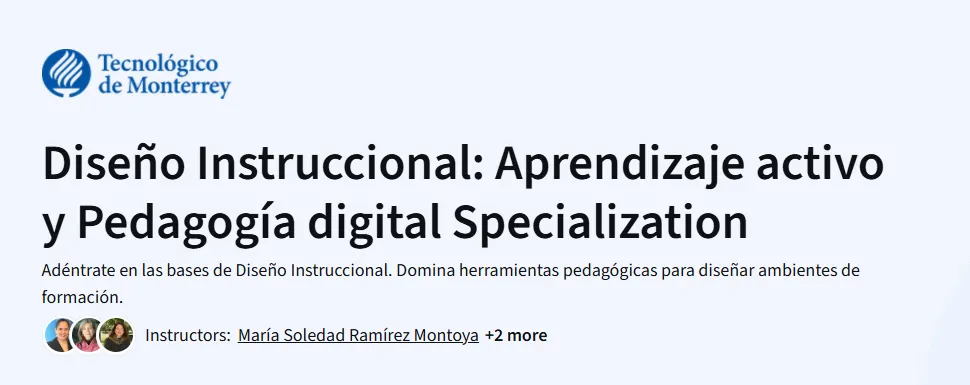What will you learn in Diseño Instruccional: Aprendizaje activo y Pedagogía digital Specialization Course
Understand the principles of instructional design applied to online learning environments.
Design effective and engaging virtual learning experiences using pedagogical models.
Create learning resources and assessments aligned with learning outcomes.
Use tools and technology to support meaningful and inclusive digital learning.
Program Overview
Module 1: Fundamentos del diseño instruccional
⏱️ 4 weeks
Topics: History and models of instructional design, ADDIE model, pedagogical approaches.
Hands-on: Analyze and design learning objectives and activities for virtual courses.
Module 2: Diseño del contenido instruccional
⏱️ 4 weeks
Topics: Content structuring, multimedia resources, interaction strategies.
Hands-on: Design a didactic unit including content, learning resources, and activities.
Module 3: Evaluación para el aprendizaje en línea
⏱️ 4 weeks
Topics: Assessment principles, formative and summative evaluation, feedback techniques.
Hands-on: Develop aligned evaluation tools with rubrics and feedback mechanisms.
Module 4: Diseño para la inclusión y la motivación
⏱️ 4 weeks
Topics: Inclusive education, motivational design, accessibility standards.
Hands-on: Redesign an existing course unit to improve inclusivity and learner motivation.
Get certificate
Job Outlook
High demand in online education, corporate training, and EdTech sectors.
Roles such as Instructional Designer, eLearning Developer, Learning Experience Designer.
Ideal for educators, content creators, and training professionals adapting to digital formats.
Enables transition into remote learning and course development roles.
Specification: Diseño Instruccional: Aprendizaje activo y Pedagogía digital Specialization
|
FAQs
- Teaches principles of instructional design that can be applied to workplace learning.
- Covers engagement strategies suitable for adult learners in professional settings.
- Helps create structured learning modules aligned with business objectives.
- Provides tools to evaluate training effectiveness using digital assessments.
- Encourages inclusive and motivating content for diverse employee groups.
- Principles of content design are flexible for mobile delivery.
- Emphasizes multimedia and interactive content, suitable for small screens.
- Supports designing short, modular learning activities for on-the-go learners.
- Introduces assessment techniques that work in app-based platforms.
- Encourages accessible design standards compatible with mobile devices.
- Focuses on designing assessments aligned with learning outcomes.
- Encourages incorporating feedback mechanisms to monitor progress.
- Suggests methods for formative and summative evaluation online.
- Introduces basic ideas of learner engagement tracking without deep analytics tools.
- Supports improvement of courses based on learner data interpretation.
- Covers accessibility standards for digital content.
- Teaches strategies to enhance inclusivity for diverse learning needs.
- Guides redesign of course materials to accommodate different abilities.
- Emphasizes motivation techniques to engage all learners.
- Provides a foundation for creating universally accessible learning experiences.
- Instructional design principles are applicable to live (synchronous) sessions.
- Supports creation of engaging asynchronous modules with multimedia.
- Helps plan activities that promote interaction in both formats.
- Provides strategies to assess learner performance across modalities.
- Encourages blending approaches for hybrid learning experiences.





